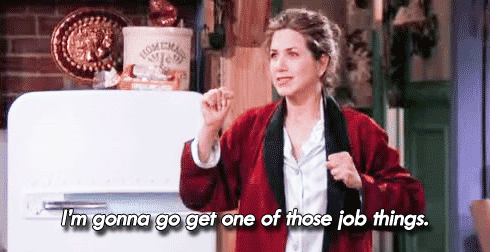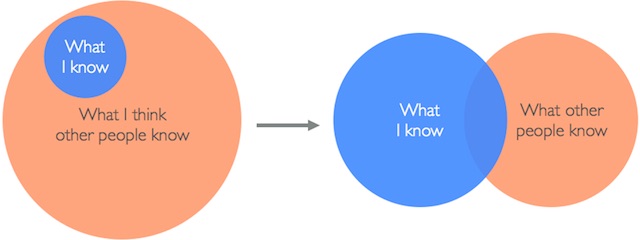feature image via shutterstock
Welcome to You Need Help! Where you’ve got a problem and yo, we solve it. Or we at least try.
Q: I’ve been on the job hunt for about a month and a half now, looking for research positions in biology. I’ve applied to about 13 jobs — was immediately turned down for three, another eight are basically still being processed, was interviewed for one and never heard back and now I have another interview scheduled for tomorrow. I’ve been stressing over my current unemployment (mainly about money, which does not, oddly enough, grow on trees). Friends and family tell me that if I’m worried about finances I should just, you know, get a job — but those don’t grow on trees, either, and I’ve applied for every new position I’m qualified for within a two-county radius.
I got a call yesterday scheduling me for another interview for a job I applied for but wasn’t entirely qualified for. I meet the basic requirements of the position but do not have the preferred experience in that particular branch of cancer medicine. I’ve been reading over the company, the research team, their publications, etc. to do my pre-interview homework, but am not entirely familiar with all of the topics covered by their research. How do I keep my confidence and do well on this interview if I’m wondering why they even picked me as a candidate? How do I play to my strengths while also being honest about aspects of the research that I don’t know? Any advice on how to win the interviewer over in spite of my nerves? And how do I stop endlessly stressing over whether or not my Bachelor’s of Science isn’t, well… just a bunch of useless BS?
(edited for length)
A: I have a bachelor’s in English writing arts and women’s studies, so basically poetry and feminism. I feel like you’ve got me beat in terms of degrees that seem vaguely useful. Here’s something you should know: your Bachelor’s degree actually doesn’t matter all that much. I know CEOs with journalism degrees, marketing managers with philosophy degrees, and government leaders with theatre degrees. Just the fact that you have a Bachelor’s degree is good enough, so try not to worry about whether your degree is perfectly fine, especially since you’re applying for jobs in your field!
Interviewing can be extremely stressful. These days, interviews are often drawn out into two, three, or more interviews, with performance samples and skills tests and all sorts of hoops to jump through. It can be discouraging to put in all that effort and still get the “You’re great, but no thanks,” letter. Or, worse, not hearing back at all. Taking it personally doesn’t help, because it’s not personal. The job market is saturated and it is genuinely hard out there, as you know. Most 20- and 30-somethings today graduated into the worst recession since the Great Depression.

Additionally, I hate when people are like, “Just get a job!” like it’s the easiest thing to do. Like you can walk into the Job Store and pick one off the shelf. Especially for queer folks who often face discrimination in hiring. It’s hard to prove, but it happens all the time, especially for folks who appear gender non-conforming in any way. My partner went to an interview for a minimum wage retail position once, got a discerning up-and-down look from the hiring manager, was told to wait in the hall and, thirty minutes later, was dismissed with a, “The job has been filled.” Had it? Seems fishy to me, but discrimination is hard to prove. You can’t win a discrimination suit on “He looked at me funny” as your only evidence.
When I first graduated from undergrad, I was on top of my game. I was a student leader with great grades and lots of connections. Unfortunately, there were just no jobs in my field in the small, mostly rural area I lived. I ended up working at a local McDonald’s, who only hired me because I’d been a McDonald’s manager at another store during college and needed minimal training. They were openly concerned I would leave if I found a better job. (Minimum wage employers don’t really want to train staff they feel are overqualified because they’re afraid they’ll bail. “Just get a job!” though!) I saw former classmates and teachers in the drive-thru who asked, confused, if I had graduated. “Yup! Would you like fries with that?” I replied. There is absolutely nothing wrong with working in food service. It just wasn’t what I went to school for or what I wanted to do and, honestly, minimum wage is criminal. As a single 22-year-old without kids or dependents and minimal bills and a middle-class upbringing and a college degree, I had to apply for government heat assistance and was eligible for food stamps on my full-time minimum wage income.
I kept applying and applying to so many jobs. Jobs I thought I was overqualified for rejected me. I was one of two applicants for an Americorp position with a $10k annual stipend and I didn’t get the position. I had a 50% chance and I didn’t get it! Finally, through luck and determination, I was offered two jobs in the very same week, one full-time at $9/hour at a local shelter and the other making about $200/week as a part-time community organizer for Planned Parenthood (an hour drive from where I lived). I accepted both, worked hard at both, sometimes pulling 80-hour weeks, and eventually went on to have a really satisfying career in nonprofit advocacy, the field I love.
Getting your first job is hard. There’s no getting around that. Once you get your foot in the door, it does typically get a bit easier. Entry level jobs often ask for 1-2 years experience, which is impossible to get without getting an entry level job! My advice? Apply anyway. With that in mind, let’s get back to your main question, though, which is about not feeling adequately prepared, feeling like the job is a little above your current experience.
A lot of us have this thing called imposter syndrome. It’s a real term, coined by two clinical psychologists in 1978. According to Dr. Pauline R. Clance and Suzanne A. Imes, imposter syndrome is when high-achieving individuals are unable to fully internalize their accomplishments and have a persistent fear of being exposed as a fraud, believing others are more intelligent and competent than they believe to be themselves. In other words…

Does this sound familiar to you? You will probably not be surprised to learn this affects women more than men. Race, gender, sexual orientation, and class can impact how likely someone is to have imposter syndrome, as can being in a transitional life stage or how you were raised to think about success. It’s not something wrong with you. It’s a reaction to the outside pressures and identities that make you call into question whether you deserve something like a job or a good partner or anything you see as a marker of success.
I’ve been on both sides of the hiring table. I’ve been the one applying for a job and the one interviewing job applicants. Here’s what I’ve learned, and it has changed how I approach applying for jobs.
Always apply for your dream job or a job you’d really like. Most job postings include a bunch of qualifications applicants should have, but you don’t actually have to have 10/10 of the qualifications. Do you have 8/10? 6/10? You are actually ahead of a large stack of the resumes that will be sifted through. An employer is thrilled to find someone who is a perfect match, but you will often get an interview even if you’re a partial match, especially if you wrote a solid cover letter and seem genuinely enthusiastic about the position.
This obviously worked for you because you have an interview! When it comes to the interview, don’t focus on the things that you don’t feel you know. Focus on the things you do know. If an area where you lack experience comes up, be honest about it, but not self-deprecating. Talk about how quickly you adapt to new tasks, how you have done a similar or related work task well in the past, your confidence that you can learn and excel in the new thing. That imposter syndrome will be creeping up in the back of your mind, but you don’t have to let it steer you.
Don’t use words like “simply” or “only” or “merely” to describe your prior experience. Even if your experience is mostly from college, that doesn’t make it less authentic. Don’t lie and don’t play spin doctor. The interviewer will see right through that. Be honest, but show confidence in your ability to learn and contribute to the team. Talk about your enthusiasm for learning and growing with the research you aren’t as familiar with, how excited you are to engage with something new.
Fake it ’til you make it. Put on a confident face, even if you know you’re going to be feeling all jelly-bellied inside. You’ll feel more confident if you over-prepare. Do a practice interview with a friend or roommate to prepare for answering on-the-spot questions. Research common interview questions and rehearse or write out your answers, just to get your thoughts out. Think about the questions you fear the most and how you would answer them before you go in. If I am feeling particularly imposter-y about an interview or opportunity I’m about to embark on, I write out a list of all the reasons I’d be bad-ass and awesome at the job/position/opportunity. It always makes me feel better.

It sounds like you’ve done deep research on the company, the research team members, their publications and work, etc. That’s fantastic! Find ways to bring it up in the interview. Everyone loves to be complimented and knowing that you went the extra mile to learn about the organization’s work may just put you over the finish line for the job. Do a little independent research on the areas you don’t know much about and, if appropriate based on who you’re interviewing with, ask questions about topics or research you find particularly interesting. Asking questions makes you look prepared and like you are genuinely interested in the work of the company.
In my opinion, it sounds like you are really well prepared already and the biggest issue is letting those feelings of self-doubt creep in. They selected you for an interview because they believe you have potential! You just have to believe it, too! Honestly, I wouldn’t enjoy a job where I wasn’t learning and growing a bit. GOOD LUCK, friend! We’ll be rooting for you! You’ve got this!
Send your questions to youneedhelp [at] autostraddle [dot] com or submit a question via the ASK link on autostraddle.tumblr.com. Please keep your questions to around, at most, 100 words. Due to the high volume of questions and feelings, not every question or feeling will be answered or published on Autostraddle. We hope you know that we love you regardless.







